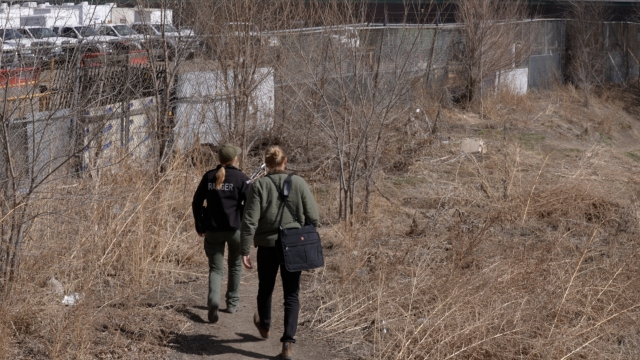“Today we’re out on patrol. We’re going to both park and trails to follow up on some calls we got,” said Caronia Distefano, a park ranger supervisor in the trails district for the City and County of Denver.
As we drove to a park location, she continued to explain a call she received yesterday.
“We met this man yesterday at a park after getting a call from maintenance,” she said. “At about 6:30 am he gave me a call and said it was a bad night, he was cold, and he wanted to get in somewhere.”
Traditionally, park rangers respond to calls in our parks to enforce rules. This can include telling people experiencing homelessness that they can’t camp in a certain area.
“We’re about protecting the parks, but the parks are for everybody and that includes people experiencing homelessness,” said Josh Glover, a park ranger manager for the City and County of Denver.
But with a new partnership involving mental health clinicians, they are able to provide more than just reciting park rules. For this case, they were able to call the STAR van to transport the person experiencing homelessness to a place he can get help.
“A lot of people don't necessarily understand that park rangers are constantly working with so many individuals in vulnerable situations,” said Tom Kaiser, a mental health clinician with WellPower.
Today, Kaiser is assisting Distefano on calls around Denver’s parks and trails.
“I’m really there to give support to the individuals who may have had historically bad interactions with law enforcement in the past,” he said.
The partnership between WellPower, a nonprofit mental health provider that specializes in things like mental health support and substance use, and the Denver Parks department started last November.
WellPower already partnered clinicians with Denver police and other departments. Their co-responder program started with the police department in 2016. The nonprofit also operates the STAR van, which helps get people from one point to another.
“When you approach people from a trauma-informed, client-centered lens and let them be the one saying, ‘this is the need I need, or this is something that would be supportive to me’ and being able to provide that, you get a really different response. Individuals are so used to being asked to leave, to move,” said Chris Richardson, the associate director of criminal justice services at WellPower.
"About 30% of our individuals are actually accessing behavioral health care post-contact,” Richardson said, referring to the program.
While the program is still new, park rangers are already seeing the difference.
“It’s been huge for us. We’ve had so many more wins since we’ve been partnered together. It means everything because we know these people, we love these people. We work with them everyday, day after day, month after month, and we weren't able to get them what they need and now we can provide that,” Distefano said.
“We’re really trying to find ways to get people out of homelessness, not just hide it,” Kaiser said.
Approximately 582,462 individuals are experiencing homelessness in America, according to an annual report by the Department of Housing and Urban Development released in December 2022.
With this new partnership, park rangers are able to provide options for lasting solutions, instead of watching individuals move their tents and belongings from one place to another, day after day.
The clinicians can offer everything from directions to the nearest shelter to access for mental health services.
“I really hope other cities across the nation can see how successful it can be and are willing to take a risk and put funding towards programs like this, as they are showing to be very, very promising and can really make an impact on the city as a whole,” Kaiser said.




